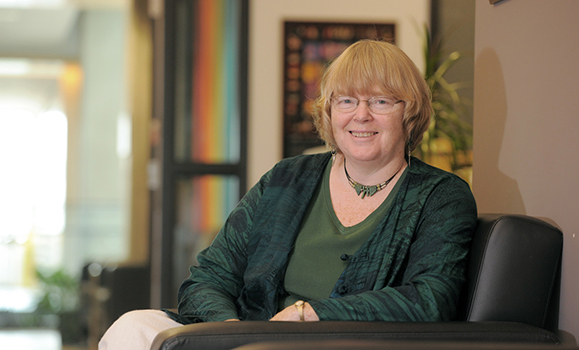As students arrive for the first day of the РВјУЖВБщәПІКҝӘҪұЦұІҘ School of Social WorkвҖҷs Advancing Social Justice class each September, they enter into a room that looks more like the inside of a kindergarten than a university lecture hall.
The room is mostly emptied of tables, except for two sitting at the front of the room covered in arts and crafts supplies. All the chairs are arranged in a big circle.
Carolyn Campbell, the courseвҖҷs professor, will be there, too. But instead of staking out a position behind a lectern, sheвҖҷll will be busy rallying the students in the class for their first assignment: something she and colleague Gail Baikie call the вҖңsocial justice collage.вҖқ Using the craft supplies, students are asked to create a symbolic image of what social justice means to them. Once they put the finishing touches on their creations, Dr. Campbell asks everyone to rip up their collage and collectively reconstruct the pieces into something new.
Asking students entering into an advanced bachelor degree in social work to spend the first three hours of a required course cutting and pasting may be unorthodox, but Dr. Campbell says the exercise serves a much larger purpose: establishing the whole constructivist epistemology of the 13-week course.
вҖңThis course establishes what we currently know and think, takes that apart and reconstructs it into something new,вҖқ explains Dr. Campbell, this yearвҖҷs recipient of DalвҖҷs top teaching award: the .
Pushing pedagogy forward
ItвҖҷs the kind of transformative educational experience вҖ” one of many in the course each year вҖ” that fits into Dr. CampbellвҖҷs larger efforts to make teaching methods more consistent with curricula content.
Dr. CampbellвҖҷs commitment to that mission comes naturally. In addition to publishing scholarly articles on critical social work pedagogy as part of her research over the years, she has also been deeply immersed in the day-to-day work around those issues in DalвҖҷs own programs.
Over the course of her 21 years at Dal, Dr. Campbell has overseen two reaccreditations of the Bachelor of Social Work program. She has also helped lead a revamp of the undergraduate program starting in 2009. She says that work has helped her situate what happens in her individual classes in the context of the overall Social Work program so that she can help students make theoretical connections.
Indeed, it was during her work on the undergrad revamp that Dr. Campbell and Dr. Baikie co-developed the Advancing Social Justice course, which she now calls one of her proudest accomplishments.

Inspiring students to challenge themselves
Bachelor of Social Work student Adrei Drezsi, who took the course last fall, says Dr. Campbell was particularly skilled at asking questions that enabled even those students who were already among the most committed to social justice to uncover assumptions they may have left unchallenged.
вҖңIt may well be that a student may be very progressive in nine out of 10 areas, but in the class they discovered there was something they hadnвҖҷt explored before вҖ” an assumption that upon reflection meant they werenвҖҷt as critical as they presumed,вҖқ says Drezsi, noting that most of the assignments were written reflections.
Drezsi counts himself among those who left the class with a new perspective about themselves. A first-generation immigrant whose parents arrived in Canada from Romania when he was 11 years old, he had always viewed himself as a вҖңthird-party spectatorвҖқ in a country with a long legacy of colonial oppression against indigenous populations.
In Dr. CampbellвҖҷs class, Drezsi says he came to see himself as part of the colonial process. HeвҖҷd requested permission to immigrate from officials in Ottawa, after all, and not from the people who originally owned the land. He says that realization also caused him to challenge his understanding of the concept of colonialism from being something that has already happened into something that is continuing to happen.
вҖңEverybody found out something new about themselves,вҖқ Drezsi says.
National impact
Dr. CampbellвҖҷs impact can be felt well beyond DalвҖҷs own Social Work programs, too. In addition to presenting and publishing scholarly papers on approaches to social work education at conferences across the country, she has also shown leadership in the field at the national level, most notably by serving as president of the Canadian Association for Social Work Education (CASWE) from May 2012 to June 2015.
That work for CASWE, the national organization that accredits all social work programs across the country, has thrust her into the national conversation on social work practice and regulation and given her a better sense for how DalвҖҷs program compares to more than three dozen others like it across the country.
Dr. Campbell has been at the forefront of developing the online teaching methods used in DalвҖҷs program. While taking some of the transformative experiences and workshops and translating them into a disembodied environment online can be a challenge, she uses content development tools such as SoftChalk to set up role-play scenarios and other interactive exercises.
For her next project, Dr. Campbell hopes to find the time to write up a bit about the methods and some of the exercises she and others in the School of Social Work use in classesВ вҖ” not a scholarly paper, she says, but an accessible handbook of sorts on critical educational practices that she can share with others.
вҖңStudents come into a social work degree with some pretty solid ideas about what it means to be a helper, what it means to be inclusive and to respect diversity,вҖқ says Dr. Campbell. вҖңWe kind of want to shake that up a bit and help them get to the root of some of the assumptions theyвҖҷre working from.вҖқ
This article is the first in a series highlighing some of the recipients of РВјУЖВБщәПІКҝӘҪұЦұІҘ's university-wide teaching awards. .

